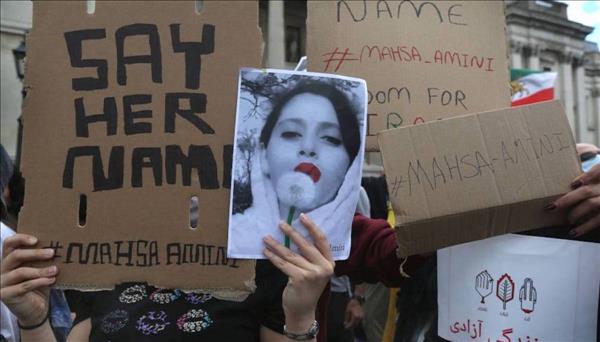(MENAFN- Asia Times) On December 6, the mayor of Tehran, Alireza Zakani, was the special speaker at the Sharif University of Technology in a ceremony to mark Students Day.
He was one of several conservative ideologues deployed to university campuses by the Iranian government to initiate dialogue with students and placate them as the nationwide protests triggered by the death in police custody of Mahsa Amini in September showed no sign of abating. Universities were particular hotbeds of protest and activism.
While the authorities consummated a campaign of mass arrests, sham trials and violence on the streets, they also touted“dialogue.”
They made a stab at appealing to young people through speeches like the one given by Zakani, as well as publicity on state TV, to drive home that they were on the right side of the history and that their response to the uprising shouldn't be construed through the prism of the international media they described as inimical.
During the Q&A part of the mayor's engagement, a young female student appeared on the stage to make some comments and ask a question. Walking to the podium without the compulsory headscarf to challenge a hardline politician who was previously a member of the basij militia was the girl's most conspicuous act of defiance.
Toward the end of her remarks, she took a swipe at the Islamic Republic for siding with the Taliban in Afghanistan and funding proxies in the Middle East such as Hezbollah, which she described as tyrannical entities.
Basij-affiliated students started booing and shouting to silence her, and Zakani, in a bid to calm down the tension and communicate his stewardship, chipped in, intoning from his seat,“Let her speak, maybe someone is interested in being the representative of the United States, or Israel.” The rest of the young woman's statements were similarly interrupted by commotion from the audience.
'Don't blame us'
Since the eruption of the“Woman, Life, Freedom” protests across Iran, to which the state has responded with an iron fist, the unvarying talking point of the authorities has been that this is not a genuine civil-rights movement; rather, it is rioting instigated by the United States and other countries with adversarial relations with Tehran.
The core demands of the people weren't ever acknowledged by the leadership, and their cries for change were willfully ignored, even though they were unequivocal in their quest: abolition of the compulsory-hijab rules, recognition of civil liberties, and as called for by many protesters, a transition away from the Islamic Republic.
Blaming the outburst of anger and the ensuing acts of civil disobedience on the United States, a well-known lightning rod in the Islamic Republic's political discourse, had the benefit of sparing the authorities the need to address the substance of the movement. But ordinary Iranians, from high-school students to pensioners, took to streets, calling on the government to stop meddling in their private sphere, lifestyle and choices.
By ascribing the uprising to foreign ill-wishers who sought to sow division in the country, the government could chart a delicate path to delegitimizing the popular demands, insisting on the failed policies that had sparked the grievances to begin with, including the entrenched compulsory-hijab rules that constitute the ideological backbone of the establishment.
In critical junctures of the timeline of the Islamic Republic, bad-mouthing the West in general and the United States in particular has always served as a survival tactic, helping the ruling clerics create grounds for national cohesion, rally the public and deflect attention from failures at home.
But this time around, the contrivance isn't working in favor of the leadership, and people are not buying into the narrative that this expansive revolt against fundamentalism and corruption can in any way be linked to actors overseas pursuing subversive agendas.
Everyone in Iran knows full well how Mahsa Amini was arrested at the whim of a morality officer, that she was hospitalized after being taken to a re-education center and photographed on the hospital bed with bruises under her eyes while bleeding from an ear, suggesting she was tortured.
And everyone knows the context against which the 22-year-old woman lost her life: more than a year of agitprop by President Ebrahim Raisi's administration over the observance of compulsory hijab and renewed funds for the morality police.
And Raisi was just putting a four-decade-old dogma on steroids and reinvigorating it precipitously. Squabbles between women and morality-police officers in public spaces, viral videos of guards abusing and mistreating girls in parks and shopping centers, and stories of the infamous vice squad resorting to brute force to administer the hijab mandate had become a long-standing routine.
There was no US footprint to inculpate, and no foreign involvement to track. It was a government-made crisis followed by an instinctive outpouring of indignation.
By accusing other countries, the authorities underlined their own inadequacies and lack of leadership. They exhibited their cluelessness about addressing a national crisis, signaling that in reaction to calls for change, they have no creative solutions to draw from their playbook of governance other than projecting their losses on to external factors.
Zakani, who proudly berated the bogeyman, the United States, in that auditorium, was most probably trying to please those who anointed him to assume the coveted mayoral position, in hopes that he can be a presidential contender in 2025 – something he has been eyeing for years.
But he must understand that cries of“it's all America's fault” have lost credibility among young Iranians who are adamantly resistant to uninventive state indoctrination.
Kourosh Ziabari is an Iranian journalist. A Chevening Scholarships alumnus, he has reported on grants by the Council of Europe, UNESCO and Deutsche Welle. He is a 2021 Dag Hammarskjold Fund for Journalists fellow and a 2022 World Press Institute fellow. In 2015, he reported from the United States, Malaysia and Pakistan on a Senior Journalists Seminar fellowship by the East-West Center. Follow him on Twitter @KZiabari.























Comments
No comment